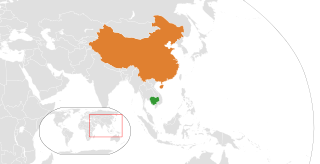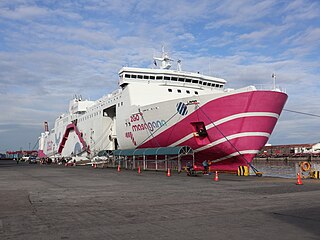
The economy of Cambodia currently follows an open market system and has seen rapid economic progress in the last decade. Cambodia had a gross domestic product (GDP) of $28.54 billion in 2022. Per capita income, although rapidly increasing, is low compared with most neighboring countries. Cambodia's two largest industries are textiles and tourism, while agricultural activities remain the main source of income for many Cambodians living in rural areas. The service sector is heavily concentrated on trading activities and catering-related services. Recently, Cambodia has reported that oil and natural gas reserves have been found off-shore.

The economy of Indonesia is a mixed economy with dirigiste characteristics, and it is one of the emerging market economies in the world and the largest in Southeast Asia. As an upper-middle income country and member of the G20, Indonesia is classified as a newly industrialized country. Estimated at over 21 quadrillion rupiah in 2023, it is the 16th largest economy in the world by nominal GDP and the 7th largest in terms of GDP (PPP). Indonesia's internet economy reached US$77 billion in 2022, and is expected to cross the US$130 billion mark by 2025. Indonesia depends on the domestic market and government budget spending and its ownership of state-owned enterprises. The administration of prices of a range of basic goods also plays a significant role in Indonesia's market economy. However, since the 1990s, the majority of the economy has been controlled by individual Indonesians and foreign companies.

The economy of Malaysia is the fifth largest in Southeast Asia and the 36th largest in the world in terms of GDP. The 2018 labour productivity of Malaysia was measured at Int$55,360 per worker, the third highest in ASEAN. The 2021 Global Competitiveness Report ranked Malaysian economy the 25th most competitive country economy in the world.

The economy of Myanmar is the seventh largest in Southeast Asia. After the return of civilian rule in 2011, the new government launched large-scale reforms, focused initially on the political system to restore peace and achieve national unity and moving quickly to an economic and social reform program. Current economic statistics were a huge decline from the economic statistics of Myanmar in the fiscal year of 2020, in which Myanmar’s nominal GDP was $81.26 billion and its purchasing power adjusted GDP was $279.14 billion. Myanmar has faced an economic crisis since the 2021 coup d'état.

The economy of Vietnam is a developing mixed socialist-oriented market economy. It is the 35th-largest economy in the world by nominal gross domestic product (GDP) and the 26th-largest economy in the world by purchasing power parity (PPP). It is a lower-middle income country with a low cost of living. Vietnam is a member of the Asia-Pacific Economic Cooperation, the Association of Southeast Asian Nations and the World Trade Organization.

The Association of Southeast Asian Nations, commonly as ASEAN, is a political and economic union of 10 states in Southeast Asia. Together, its member states represent a population of over 600 million over a land area of 4.5 million km2 (1.7 million sq mi). The bloc generated a purchasing power parity (PPP) gross domestic product (GDP) of around US$10.2 trillion in 2022, constituting approximately 6.5% of global GDP (PPP). ASEAN member states include some of the fastest growing economies in the world.
SuperFerry was one of the largest ferry companies in the Philippines before it was purchased by Negros Navigation, which simultaneously was purchased by the Chinese government through its private equity fund the China-Asean Investment Cooperation Fund, and became 2GO Travel, part of the 2GO Group.
Cebu Ferries was a shipping company based in Cebu City, Philippines. Its hubs were at Pier 4 in Cebu City. It is now part of 2GO Travel.

Negros Navigation Co., Inc. (NENACO) was one of the oldest domestic shipping companies in the Philippines. It was also one of the largest companies in the passenger transport business in the Philippines. Its main hub was the renowned Pier 2 in Manila North Harbor. NENACO later merged with SuperCat, SuperFerry and Cebu Ferries to form 2GO Travel, the second largest Philippine shipping merger next to the William Lines-Gothong Lines-Aboitiz Shipping merger (WG&A) in 1996. At the same time, the China-Asean Investment Cooperation Fund, a private equity fund wholly owned by the government of the People's Republic of China through an equity infusion, gained a controlling interest in Negros Navigation and subsequently changed the company into the 2GO Group with 2GO Travel, its shipping-company subsidiary.

2GO Air is a logistics and supply chain cargo airline based in Parañaque, Philippines. It operates bulk cargo and express parcel services throughout the Philippines. Its main base is Ninoy Aquino International Airport, Manila. 2GO is operated by the Aboitiz Air Transport Corporation the transport and logistics company owned by Aboitiz Equity Ventures.

The bilateral relations between the Kingdom of Cambodia and the People's Republic of China have strengthened considerably after the end of the Cambodian–Vietnamese War, during which China had supported the Khmer Rouge against Vietnam.

China has an upper middle income, developing, mixed, socialist market economy incorporating industrial policies and strategic five-year plans. It is the world's second largest economy by nominal GDP, behind the United States, and the world's largest economy since 2016 when measured by purchasing power parity (PPP). China accounted for 19% of the global economy in 2022 in PPP terms, and around 18% in nominal terms in 2022. The economy consists of public sector enterprises, state-owned enterprises (SOEs) and mixed-ownership enterprises, as well as a large domestic private sector and openness to foreign businesses in their system. Post-1978 economic reforms China's average GDP growth had been over 10% annually for over three decades, and in some years, growth exceeded 14% annually.
SEAVI Advent Private Equity is the first private equity and venture capital firm in Southeast Asia. Since its founding in 1984 by Peter Brooke, the firm has invested over US$800 million into more than 120 Asian companies. SEAVI Advent operates from three offices and is the Asia affiliate of Advent International, with an established long-term strategic partnership with Advent International in the Greater China region.

The SuperCat Fast Ferry Corporation, commonly known as SuperCat, is a shipping company that operates a fleet of high-speed catamarans (HSC) in the Philippines.
The ASEAN–India Free Trade Area (AIFTA) is a free trade area among the ten member states of the Association of Southeast Asian Nations (ASEAN) and the Republic of India. The initial framework agreement was signed on 8 October 2003 in Bali, Indonesia. and the final agreement was on 13 August 2009. The free trade area came into effect on 1 January 2010. India hosted the latest ASEAN-India Commemorative Summit in New Delhi on 26 January 2018. In the financial year 2017–18, Indo-ASEAN bilateral trade grew by almost 14% to reach US$81.3 billion. India's imports from ASEAN were valued at US$47.13 billion while its exports to ASEAN stood at US$34.2 billion.

2GO or 2GO Sea Solutions, also known as 2GO Travel, is a passenger ferry company based in Manila, Philippines, the shipping and passenger ferry arm of 2GO Group, and the only remaining Manila-based major interisland passenger ferry company, with its main hub located in Pier 4 at the Manila North Harbor.

2GO also known as 2GO Group Inc. is a Philippines-based company engaged in transporting people and cargo using the fleet of inter-island ferries and cargo ships. The top two principal shareholders of the 2GO Group are SM Investments Corp, and Trident Investments. The company has the largest infrastructure in the Philippines with over 400,000 TEU capacity, 16 passage and freight vessels, 15,000 containers, 35 warehouses nationwide, 550 trucks, and 7,000 employees.

Aboitiz Equity Ventures (AEV) is a Philippine holding company based in Metro Manila, with roots from Cebu City. The conglomerate operates in six major industries: Power, Banking and Financial Services, Food, Infrastructure, and Data Science and Artificial Intelligence. In 2017, the company was ranked 1793rd on the Forbes Global 2000. In 2022, AEV ventured into transforming its organization into a "Techglomerate" - a faster, stronger, and better version of a conglomerate. A techglomerate can refer to a startup tech company that has grown into a conglomerate or a legacy conglomerate that has used technology and startup culture to radically transform the way it behaves and operates. AEV is the latter of the two.
Green finance is officially promoted as an important feature of the Belt and Road Initiative, China's signature global economic development initiative. The official vision for the BRI calls for an environmentally friendly "Green Belt and Road".
The China-Central and Eastern Europe Investment Cooperation Fund is the investment component of the Cooperation between China and Central and Eastern European Countries framework, a diplomatic initiative to enhance cooperation between China and Central and Eastern European Countries, a region in China's Belt and Road Initiative. The initial China-CEE Fund was established in 2013. Building on the success of the first fund, a second one was created in 2017.















